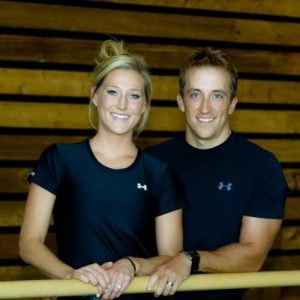Sweat: The Gym Where “Everybody Knows Your Name”
When your clients tell you it’s time to go into business for yourself, maybe you should listen. Just ask Katie and Kegan Corkill, fitness professionals and founders of Sweat gym in Dallas.
“I tried three different times” to get a gym started, says Kegan. “But every time, it never felt comfortable.”
Then he met Katie Rhodes. They started dating.
“I was on the verge of taking a regional manager position for a client who wanted to get into the fitness industry,” says Kegan. Then another fitness client who was well-connected in the commercial real estate world said Kegan and Katie “had what it took” to start their own gym.
“We knew we could do it if we got the right people together,” says Kegan.
“We were also working with clients who are great at whatever they do, from commercial real estate to marketing and business in general,” says Katie. As the idea for the gym started to look like a reality, she says they made sure to ask a lot of questions. “We were able to bounce our ideas off our clients and avoid stumbles.”
Soon, Katie and Kegan found they had an advisory board that reads like a Who’s Who of businesspersons in the United States.
“The guy who initially wanted me to work for him ended up becoming an investor,” says Kegan. Ultimately, the Corkills were able to secure the majority of the capital for Sweat through clients and others, without having to rely on family and friends.
The couple continued to date and eventually became engaged.
“I had a lot of confidence in her,” says Kegan. “I knew we could make it work.”
“Divine intervention got us the spot we wanted”
Sweat opened on October 6, 2011, after just over a year of preparation. At the time, the commercial real estate market in Dallas was in the doldrums. The Corkills initially wanted the space formerly occupied by Good Bodies, a Park Cities legend on Lovers Lane with a cult following that had shut down. In the meantime, the former Good Bodies members were not being served.
Sweat was the first to submit a bid. But there was a lot of competition, and the prized location did not work out. Nevertheless, the loss turned out to be a gain.
“Divine intervention got us the spot we wanted,” says Kegan.
That spot is Sweat’s ultimate home: a prime location on the north side of Lovers Lane, with easy parking and access to the Park Cities neighborhoods where many Sweat members live.
“The space has a ton of natural light,” compared to other gyms, says Katie. “It’s the difference between a cubicle and a corner office with windows.”
Staying true to their belief that it’s necessary to partner with the right people, the couple quietly gathered other trainers they had previously worked with who were interested in joining the staff.
“It’s nice to work with people we trust who trust us,” says Katie. Sweat’s trainers are contract employees, which Katie says differs from the way many big box gyms operate. “We’re able to give trainers a bit more.”
The Corkills also create an atmosphere that is devoid of the kind of backbiting that can hurt any business.
“It’s kind of like the Cheers of gyms,” says Kegan. “Where ‘everybody knows your name.’ It really has a small, family feel.”
In spite of the challenges of securing building permits and dealing with equipment vendors, Kegan and Katie managed to take time to get married in June, four months before Sweat launched.
“We sold our first membership to an investor at 8:00 p.m.,” says Katie, recalling the moment Kegan texted her the news as she was buying supplies. “It’s the little things, the milestones, that make it exciting.”
Since Sweat opened, the Corkills have almost tripled the number of personal trainers on staff. In an industry where many trainers stay for short periods of time, Sweat breaks the trend.
“We take pride in having very low turnover,” says Katie. “We work with career trainers who are able to take care of themselves.”
Kegan says that competitive pay and strong relationships are key, and Katie notes that the gym operates more efficiently as a result of the stability among the staff.
“Time is our greatest commodity,” says Katie, adding that trainers who have to travel from gym to gym are wasting time that could be better spent with clients. Sweat aims to keep trainers focused on operating from one location, an optimal business arrangement for everyone.
“We keep ours fed, happy, and full,” adds Kegan.
“It’s kind of like the Cheers of gyms,” says Kegan. “Where ‘everybody knows your name.’
The pair finds that for entrepreneurs growing a business, it’s best to let people do what they’re good at.
“Kegan’s a great negotiator,” says Katie. “He can handle himself in meetings. He’s the big picture guy. When I’m not training, I prefer to work on payroll, accounting, and paperwork.”
That belief extends to everyone who supports Sweat.
“You don’t know what you don’t know,” says Kegan. As experienced fitness professionals, the couple initially felt like they had a firm grasp on how to operate their own gym. “But we quickly realized there’s only so much you can do. If you don’t understand something, find someone who does. You’ll burn yourself out if you try to do it all.”
In spite of ultimately having all the elements fall into place, the couple offers some advice.
“It can look like a mountain,” says Katie. “Take one step at a time. When you finish one thing, do the next thing you know how to do.” And if you don’t, “Ask, delegate, and outsource.”
Kegan also advises to be determined when negotiating with vendors whose primary concern may be their own bottom line.
“No one will care about your business as much as you do,” he says.
On starting a business with the person who will become your spouse, the couple advises setting boundaries and taking time to enjoy family life, like the couple’s pre-school-aged children.
“Between the two of us, it’s best to shut work off,” says Katie.
“You have to be able to eat, breath, and sleep the business for the first several years,” adds Kegan, who explains that one of them had to open the gym at five a.m. and the other had to close at 9 p.m. “You have to really want it,” he says. “But it’s better than the What If” of wondering whether you are ready to open your own business.
“No one will care about your business as much as you do”


